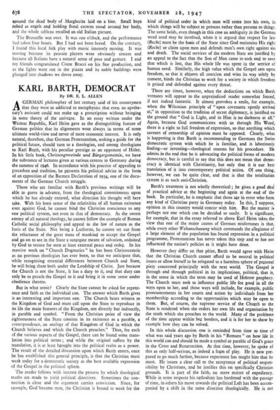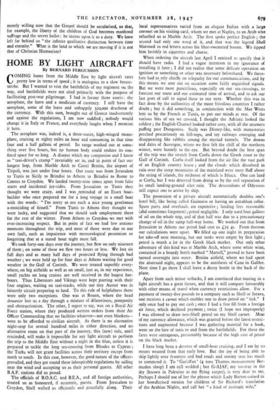KARL BARTH, DEMOCRAT
By DR. E. L. ALLEN
AGERMAN philosopher of last century said of his countrymen , that they were so addicted to metaphysics that even an apothe- cary's assistant could not make up a prescription without bringing in some theory of the universe. In an essay written under the Weimar Republic, Karl Heim gave as the distinguishing feature of German politics that its alignments were always in terms of some ultimate world-view and never of mere economic interest. It is only natural, therefore, that German Protestantism, seeking a guide for the political future, should turn to a theologian, and among theologians to Karl Barth, with his peculiar prestige as an opponent of Hitler. In his little book, Christengemeinde and Burger gemeindie, we have the substance of lectures given at various centres in Germany during the summer of 1946. In accordance with his practice of appealing to precedent and tradition, he presents his political advice in the form of an exposition of the Barmen Declaration of 1934, one of the docu- ments of the German Church struggle.
Those who are familiar with Barth's previous writings will be abk to guess in advance, from the theological commitments upon which he has already entered, what direction his thought will here take. With his keen sense of the relativities of all human existence over against God, he cannot bind the Christian conscience to any one political system, not even to that of democracy. As the sworn enemy of all natural theology, he cannot follow the example of Roman Catholic social philosophy and appeal to the law of nature as the basis of the State. Not being a Lutheran, he cannot set out from the reluctance of the great mass of mankind to accept the Gospel and go on to see in the State a surrogate means of salvation, ordained by God to secure for men at least external peace and order. In his massive work on " Church Dogmatics " he has been Christocentric as no previous theologian has ever been, so that we anticipate that, while recognising essential differences between Church and State, he will bring them both under the Lordship of Christ. Just because the Church is not the State, it has a duty to it, and that duty can only be to preach the Gospel to it and bring it in some sense under obedience thereto.
But in what sense? Clearly the State cannot be asked for repent- ance and faith as the individual can. The answer which Barth gives is an interesting and important one. The Church bears witness to the Kingdom of God and must call upon the State to reproduce in its life the main features of the Kingdom, not directly but indirectly, in parable and symbol. " From the Christian point of view the righteousness of the State consists in its existence as a parable, a correspondence, an analogy of that Kingdom of God in which the Church believes and which the Church preaches." Thus, for each of the various aspects of the Gospel, there can be found some trans- lation into political terms ; and while the original suffers by the translation, it is at least brought into the political realm as a power. The result of the detailed discussion upon which Barth enters, once he has established this general principle, is that the Christian must work today for a democratic society as the best available expression of the Gospel in the political sphere.
The reader follows with interest the process by which theological truths are made to yield political directives. Sometimes the con- nection is close and the argument carries conviction. Since, for example, God 'became man, the Christian is bound to work for the kind of political order in which man will come into his own, in which things will be subject to persons rather than persons to things. The same holds, even though in this case an ambiguity in the German word used may be involved, when it is argued that respect for law (Recht) must be the basis of the State since God maintains His right (Recht) or claim upon men and defends man's own right against sin and death. The social services of the modern State are justified by an appeal to the fact that the Son of Man came to seek and to save that which is lost, that His whole life was spent in the service of human need. Similarly, the high value which the Gospel sets upon freedom, so that it abjures all coercion and wins its way solely by consent, binds the Christian to work for a society in which freedom is prized and defended against every threat.
There are times, however, when the deductions on which Barth ventures will appear to the unprejudiced reader somewhat forced, if not indeed fantastic. It almost provokes a smile, for example, when the Wilsonian principle of " open covenants openly arrived at," in opposition to the tradition of secret diplomacy, is justified on the ground that " God is Light, and in Him is no darkness at all." Again, because God communicates with us through His Word, there is a right to full freedom of expression, so that anything which savours of censorship of opinion must be opposed. Clearly, what is happening is that Barth is recommending to Germans the Swiss democratic system with which he is familiar, and is laboriously finding—or inventing—theological reasons for his procedure. He admits in the end that he is advocating the political forms of modern democracy, but is careful to say that this does not mean that demo- cracy is identical with Christianity, but only that it is our best translation of it into contemporary political action. Of one thing, however, we can be quite clear, and that is that the totalitarian system is as such anti-Christian.
Barth's treatment is not wholly theoretical ; he gives a good deal of practical advice at the beginning and again at the end of the book. In particular, he is emphatic that those are in error who form any kind of Christian party in Germany today. In this, I suppose, opinion in this country would concur with him. But the matter is perhaps not one which can be decided so easily. It is significant, for example, that in the essay referred to above Karl Heim takes the view that one of the major causes of German misfortunes is that, while every other Weltanschauung which commands the allegiance of a large element of the population has found expression in a political programme, Protestantism has never taken this step and so has not influenced the nation's policies as it might have done.
However they differ on that point, Barth would agree with Heim that the Christian Church cannot afford to be neutral in political issues or allow herself to be relegated to a harmless sphere of personal piety concerned principally with the next world. The Gospel is through and through political in its implications, political, that is, in the sense in which the term may be used of Hebrew prophecy. The Church must seek to influence public life for good in all the ways open to her, and those ways will include, for example, public pronouncements in her courts and action by individuals from her membership according to the opportunities which may be open to them. But, of course, the supreme service of the Church to the State is rendered when she orders her own life and organisation by the truth which she preaches to the world. Many of the problems of the time appear within her borders, and it is for her to show by example how they can be solved.
In this whole discussion one is reminded from time to time of what was said years ago by Barth in his " Romans " on how life in this world can and should be made a symbol or parable of God's grace in the Cross and Resurrection. At that time, however, he spoke of this as only half-serious, as indeed a form of play. He is now pre- pared to go much farther, because experience has taught him that he must. He issues a clear call to the acceptance of political respon- sibility by Christians, and he justifies this on specifically Christian grounds. It is part of the faith, no mere matter of expediency. While in some respects his orthodoxy has hardened with the passage of time, in others his move towards the political Left has been accom- panied by a shift in the same direction theologically. He is not
merely willing now that the Gospel should be secularised, so that, for example, the liberty of the children of God becomes manhood suffrage and the secret ballot : he insists upon it as a duty. We have left far behind us " the infinite qualitative distinction between time and eternity." What is the land to which we are moving if it is not that of Christian Humanism?





























 Previous page
Previous page